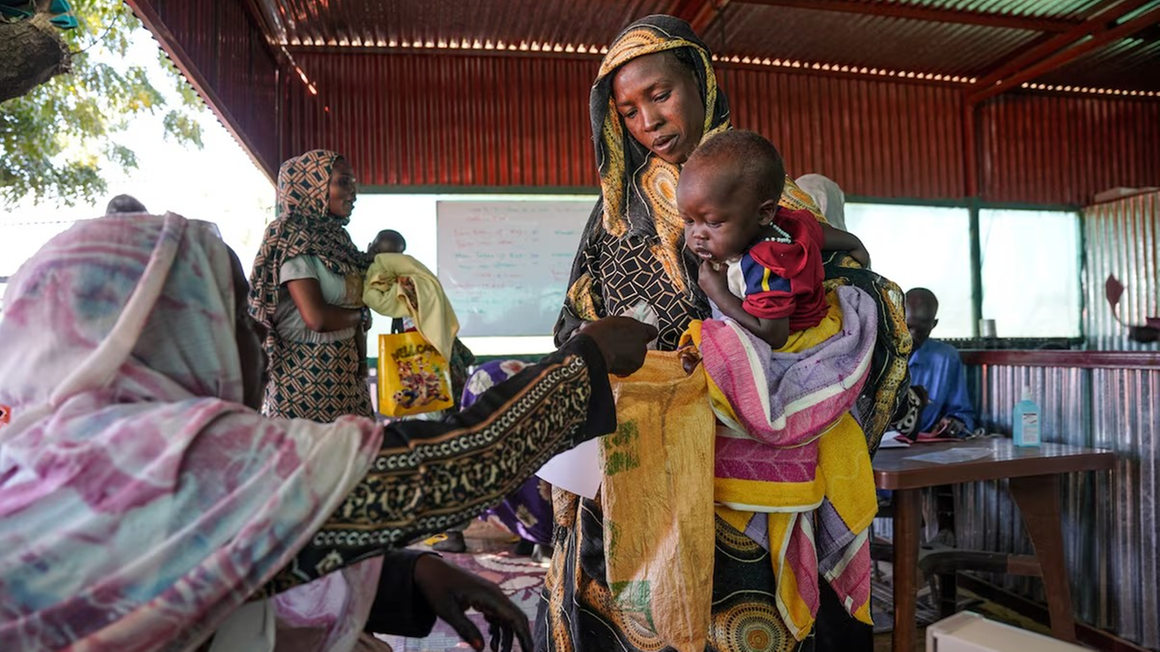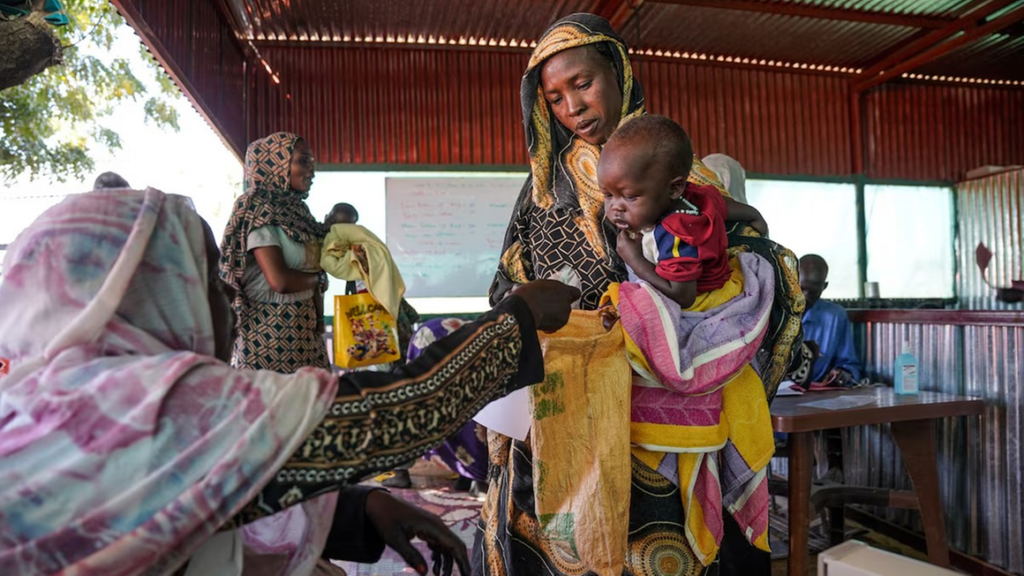

A handout photograph, shot in January 2024, shows a woman and baby at the Zamzam displacement camp, close to El Fasher in North Darfur, Sudan. PHOTO | MSF via REUTERS
The African Union (AU) is launching another bid to save Sudan from war, even as it fights what it calls a proliferation of mediation channels competing with one another, amid a mounting humanitarian crisis.
This week, the African Union Peace and Security Council endorsed an “all-inclusive” meeting for July 10 to 15 in Addis Ababa, Ethiopia, where Sudan’s warring factions and other political movements are to meet.
Known as Political Dialogue, it is to be led by the African Union High-Level Panel on Sudan whose chair is Ghanaian lawyer Mohamed Ibn Chambas who is also the AU High Representative for Silencing the Guns. Other members are former Ugandan Vice-President Specioza Wandira-Kazibwe and Mozambican diplomat Fransisco Madeira.
Theirs is supposed to create “a durable people-driven solution to the conflict and restoration of constitutional democratic order in Sudan for a brighter future,” the AU Peace and Security Council said this week in a dispatch released after they met last week on Friday. But the 15-member AU organ also admitted that will depend on the warring factions attending.
The other was fronted by the Intergovernmental Authority on Development (Igad), the regional bloc to which Sudan belongs. But this too flopped as Sudan rejected Kenya’s lead role in it. Later, Igad joined the Jeddah Process, backed by the African Union. Last month, Sudan officials refused to attend talks, collapsing the new round in Jeddah.
The Council underlines the importance of enhanced coordination and complementarity peace efforts through the AU, Igad and neighbouring countries collaboration. However, it authorised Egypt to facilitate the dialogue among Sudanese actors from next week “to complement the ongoing efforts to convene the AU/Igad-led Inclusive Dialogue.”
The 1218th meeting on June 21 was chaired by Uganda, this month’s rotating chair. Other countries in the Council are Angola, Botswana, Cameroon, Cote d’Ivoire, Djibouti, Democratic Republic of Congo, Egypt, Equatorial Guinea, Morocco, Namibia, Gambia, Nigeria, Tanzania, and Sierra Leone.
Without naming names, the AU thinks external interference is fueling the conflict in Sudan.
The Council said there has been flagrant violation of all AU communiqués and UN Security Council Resolutions on Sudan, including last month’s call to allow humanitarian corridors.
Last month, Sudan accused the United Arab Emirates (UAE) of supplying weapons to RSF. Khartoum made the accusations on the floor of the UN Security Council. On Thursday, the UAE gave a response to the Council, declaring the accusations as “fabrications.”
“It is unfortunate that the Sudanese representative has sought to mislead the international community by excluding important information and context about Sudan’s recent history,” the UAE said.
According to Abu Dhabi, UAE offered legal support to security agencies in the past to Sudan, including the RSF which “was legally recognised in Sudan as nationally composed military forces with functions including supporting and assisting the Armed Forces and other government forces to perform their functions.
“Decisions on the distribution of materiel of the State were made by the Sudanese Government,” it said.
Since Sudan erupted in war in April 2023, there have been nearly 17,000 people killed in the violence, according to figures from the Armed Conflict Location and Event Data Project, a data portal on hotspots.
Sudan has also become the biggest humanitarian crisis in Africa, displacing 10 million people, 1.5 million of whom are in neighbouring countries.
A new report this week said Sudan was already experiencing famine, with over 25 million people facing starvation as the conflict continues.
The latest Integrated Food Security Phase Classification (IPC) report projects that from June to September 2024, more than 755,000 will face hunger in 10 states in Sudan including Greater Darfur, which comprises five states, South and North Kordofan, Blue Nile, Al Jazirah and Khartoum.
War zones
Fields and farms have become war zones and the health system is in shambles, leaving millions in desperate need, as the war between RSF and SAF continues. Famine now threatens to ravage 14 areas in one of Africa’s largest countries.
Chief Executive Officer of Mercy Corps, Tejada D’Oyen McKenna, says the latest IPC analysis exposes the stark reality of starvation in Sudan after 14 months of relentless conflict.
“For months now, parts of Sudan, notably greater Darfur, have been cut off from aid and deprived of food, clean water and healthcare.
The conflict’s expansion into breadbasket regions has devastated food production, causing severe malnutrition among children, pregnant women and breastfeeding mothers, the chronically ill, and the elderly,” said Mr McKenna.
The IPC, launched in 2019 by a global partnership of governments and non-governmental agencies such as FEWS NET, is a common scale for classifying the severity and magnitude of food insecurity and acute malnutrition, which improves the transparency, relevance, and comparability of food security and nutrition analysis for those in authority to take appropriate action.
In Sudan, aid organisations have sounded the alarm. Still, despite repeated warnings, the global response remains shamefully inadequate, with the Humanitarian Response Plan only 17 percent funded according to the United Nations Office for the Coordination of Humanitarian Affairs financial tracking system.
“If the warring parties do not respect international humanitarian law and facilitate humanitarian access, the Security Council should take action to ensure life-saving aid is delivered and distributed, and leverage all the tools at its disposal, including authorizing aid to move from neighboring countries,” warned Linda Thomas-Greenfield, the US Ambassador to the UN, commenting on the report on Thursday.
“The people of Sudan desperately need an immediate end to the fighting; unhindered humanitarian access; a transition to civilian governance, with no role for the military in governing Sudan; and accountability for crimes committed to help the nation heal.”
